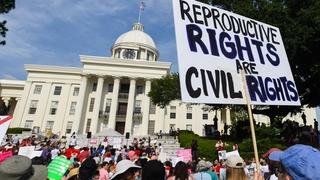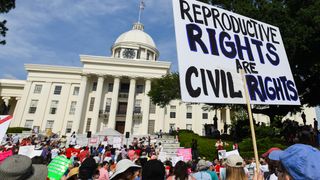Several states are competing to pass the most draconian abortion restrictions ever devised in the United States. These so-called "heartbeat bills" eliminate access to abortion after six weeks, before many women even know they are pregnant, and offer no exceptions for pregnancies resulting from rape or incest. In Alabama, a new law would ban abortion outright. Many of these bills also allow or even require harsh prison sentences for women who have abortions and doctors who provide them.
On social media, opponents of these laws circulated composite images of the all-male coalitions who passed them, underscoring the absence of women legislators. But while their point about representation is important, that focus on the men behind the bills obscures the role of women like Governor Kay Ivey, who signed Alabama's abortion bill into law just a few days ago.
These women are a vital part of this story, a reminder that anti-women laws are less a product of male politicians, and more a function of patriarchal politics.
These women are a vital part of this story, a reminder that anti-women laws are less a product of male politicians, and more a function of patriarchal politics.
This should not come as a surprise, given the central role of women in forging a politics of anti-feminism in the 1970s and 1980s – especially in the rise of anti-abortion politics. In an era in which some women were calling for equal rights, political power, and personal autonomy, others were fighting to retain the benefits bestowed by traditional gender roles.
These women were vital players in a new era of conservative politics that would fundamentally transform the United States. That they were women mattered: their ability to leverage their authority as mothers, wives, and women – identities that gave them authority in the spheres of sex, reproduction, and education that they lacked in other parts of American politics. (Identity politics, usually ascribed as a quality of the left, has long been just as prevalent, if not as obvious, on the right.)

And leverage it they did. Whether it was Phyllis Schlafly working against equal rights for women, or Anita Bryant fighting gay rights as part of her Save our Children campaign, or Louisa Day Hicks lobbying against the racial integration of schools in Boston, throughout the 1970s conservative women were leading massive grassroots political campaigns.
It was the campaign against abortion rights, however, where female activists were most important. Men, particularly religious leaders, were often part of these campaigns, but the optics of male politicians rebuking and lecturing women about their reproductive choices became more and more offputting in an era when feminists were making genuine strides in American society. By allowing women to take a leading role in the movement, anti-abortion activists were able, at least symbolically, to counter arguments about men legislating women's bodies against their will.
Since 2010, hundreds of new abortion restrictions have been put in place at the state level as activists sought ways to sidestep Roe v. Wade.
In the decades that followed, female anti-feminists became a crucial part of the conservative movement and Republican politics. In the 1990s, anti-feminists like Ann Coulter and Laura Ingraham took the baton from Schlafly, building their punditry careers on sharp criticisms of feminism. And white evangelical women became a crucial part of the GOP coalition (comprising most of the 53 per cent of white women who voted for Donald Trump in 2016).
While they have not succeeded in overturning Roe v. Wade, the Supreme Court ruling that legalised abortion in the first and second trimester across the United States, female anti-feminists have scored plenty of victories. Schlafly successfully stopped ratification of the Equal Rights Amendment, which would have embedded equal rights for women in the Constitution. American schools remain starkly segregated in practice if not in law, and conservatives control school boards across the nation.
Abortion laws, too, have been rolled back if not repealed. Since 2010, hundreds of new abortion restrictions have been put in place at the state level as activists sought ways to sidestep Roe v. Wade. Several states have only one abortion provider to serve the entire population. The new laws represent a final push to do away with abortion protections altogether; with five conservative justices on the Supreme Court, they might succeed.
The anti-feminist women who have helped roll back reproductive rights have played a critically important role in demonstrating the flaws in how many Americans understand feminist politics: both feminism and anti-feminism are not a function of gender but of politics. And while that might seem self-evident, it was neither clear in the 1970s, when few men publicly identified as feminist, nor in the current era, when people too readily identify the "war against women" as one in which all the antagonists are men (a sense sharpened by the #MeToo movement, which has highlighted the ways women remain subject to harassment and violence by men).
The #MeToo movement is actually a useful way of understanding the limits of women's anti-feminism. Political commitments cannot protect a person from the consequences of patriarchy: anti-feminist women endure sexual violence; anti-abortion women face unwanted pregnancies and seek abortions. The irony – and really, the tragedy – of female anti-feminists is that their activism increases their own vulnerability. That is not something to be mocked. It is something to be mourned.






